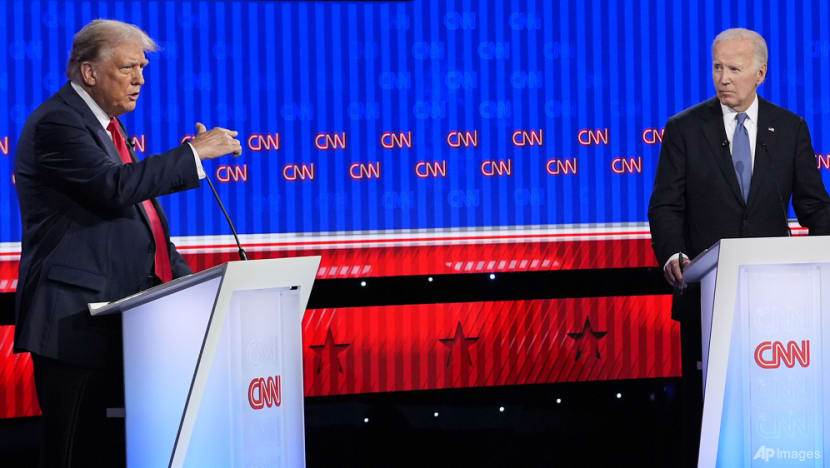Commentary: Under Biden or Trump, the US will be an increasingly unreliable partner in Asia
Whether Donald Trump or Joe Biden wins the US presidential election in November, American foreign policy will likely be less focused and coherent, says Robert Kelly of Pusan National University.


This audio is generated by an AI tool.
BUSAN, South Korea: In the last few days, former United States president Donald Trump received a substantial boost to his efforts to return to the White House. On Jun 27, he debated sitting US President Joe Biden, whose performance was one of the worst in the history of televised US presidential debates.
Mr Biden’s delivery was halting and confused. He frequently appeared lost in his own answers, and this has fed directly into widespread, longstanding fears that he is too old for another term as president.
There is now vigorous debate inside the Democratic Party on whether - and if so, how - Mr Biden should be replaced as the election candidate in the fall. However, the chaos that would likely ensue such a step could ensure a Trump victory.
Then on Jul 1, the US Supreme Court determined that much of Trump’s controversial behaviour in his first presidential term from 2017 to 2021 was shielded by presidential immunity. The remaining court cases against Trump will now extend beyond election day (Nov 5), and if Trump wins that election, he will simply dismiss these cases.
The Trump immunity ruling potentially revolutionises the US president’s accountability before the law. The Court has stipulated that the president now has “absolute immunity” for “official acts” performed in his capacity as president. “Official acts” are left undefined, ensuring plenty of future litigation about what is and isn’t “official”.
But it appears to effectively put the president above the law while in office. Trump’s lawyers even argued that the president could execute a political rival as an “official act”. This contradicts the spirit of the American Revolution and the framing of the US Constitution which explicitly sought to limit executive, monarchical power.
Had this holding existed in 1972, for example, the Watergate investigation of former US president Richard Nixon would likely not have been possible. There is widespread anxiety over how Trump would use this latitude if he returns to office next year.
TRUMP AND TURMOIL
A return of Trump to the US presidency promises substantial turmoil in US domestic politics, worsening US foreign policy confusion.
At home, Trump has promised an angry, vengeful return to the presidency. He has spoken of jailing his opponents, a massive crackdown on illegal immigration and urban crime, and using government agencies against perceived liberal critics like the media and academia.
This will likely activate widespread resistance, as it did in his first term. But this time the stakes will be higher and the conflict sharper. Protests and street violence seem likely.
This domestic chaos will distract Washington and wash into US foreign policy. Many Trump domestic initiatives will land in court and his administration will face protest and resistance from the start, making it even harder to focus Trump on foreign policy.
A REDUCED BIDEN
However, regardless of the election’s victor, US foreign policy will likely be less focused and coherent. If Mr Biden wins, his cognitive limitations may increasingly inhibit his foreign policy-making. His attendance at overseas events, for example, may drop, because they will be more physically difficult for him.
Mr Biden may be less capable of acting in unscripted environments, like direct negotiations with foreign leaders. This will make treaty negotiations - where direct presidential input is often necessary to resolve thorny issues - difficult. This will affect US relations in Asia particularly, where personal relationships between leaders is highly prized.
A reduced Biden will also invite staff conflict and empire-building in the US foreign policy bureaucracy. Ambitious officials will find it easier to go around Mr Biden to pursue their own agendas.
This has often been a problem in US foreign policy: Ronald Reagan, George W Bush and Trump were all too weak or hold to contain staff infighting and freelancing. This seems likely for Mr Biden too, as he would be 86 at the end of his second term.

FOREIGN POLICY UNDER TRUMP
Based on Trump’s own statements and those of his advisors, Trump plans to take a more belligerent approach toward US allies and partners.
In his first term, many of his riskiest foreign policy ventures - such as withdrawing from the North Atlantic Treaty Organization (NATO) or ending the US-South Korea alliance - were derailed by his staff, most of whom were traditional Republican foreign policy hands such as former national security adviser John Bolton.
Trump has signalled that he will retain loyalists who will not countermand him or try to contain him, if he secures a second term.
The most immediate foreign policy impact of Trump’s return would be felt in Europe, specifically in the Russia-Ukraine war. Trump clearly admires Russian President Vladimir Putin and dislikes Ukrainian President Volodymyr Zelenskyy.
Trump has stated several times that he would end that conflict “in one day”. This is highly unlikely of course, but it appears that he means to cut off US aid to Ukraine to force it to negotiate. Ukraine would likely face Russian terms to permanently cede the areas Russia has conquered.

If Trump wins, the biggest changes in Asia would be in US ties with South Korea and Taiwan. He has already spoken of withdrawing US forces from South Korea if he is re-elected. However, he may face sharp resistance from American lawmakers and the foreign policy committee, just as US president Jimmy Carter did in the 1970s when he tried to do the same.
But South Koreans are already talking about developing nuclear weapons if Trump is elected. Indeed, other US allies, such as Poland and Japan, may go nuclear too if Trump abandons them, which may increase the likelihood of nuclear proliferation elsewhere. Trump does not share the long-standing US nonproliferation goals.
Taiwan too would experience some Trumpian abandonment. Trump has said Taiwan cannot be defended, and has evinced no normative or ideological interest in doing so. Indeed, Trump has spoken of his admiration for Chinese President Xi Jinping. Mr Biden has said repeatedly that he would fight for Taiwan; Trump will almost certainly reject that, leaving Taiwan’s fate uncertain.
US ALLIES SHOULD PREPARE THEMSELVES
US foreign policy since World War II has broadly been liberal and internationalist, resisting totalitarian ideologies like communism and Islamic fundamentalism. Trump ignores these values for a transactional foreign policy that sees no distinction between autocracies and democracies.
Indeed, Trump seems to admire autocrats and their ability to act at home without law or constraint. They can do domestically what he cannot.
Though a second Biden administration will have its faults, the domestic chaos Trump unleashes in the US will feed into the unreliable, unpredictable foreign policy he will pursue. US allies in Europe and Asia should prepare themselves.
Robert Kelly (@Robert_E_Kelly) is a professor of political science at Pusan National University.



















